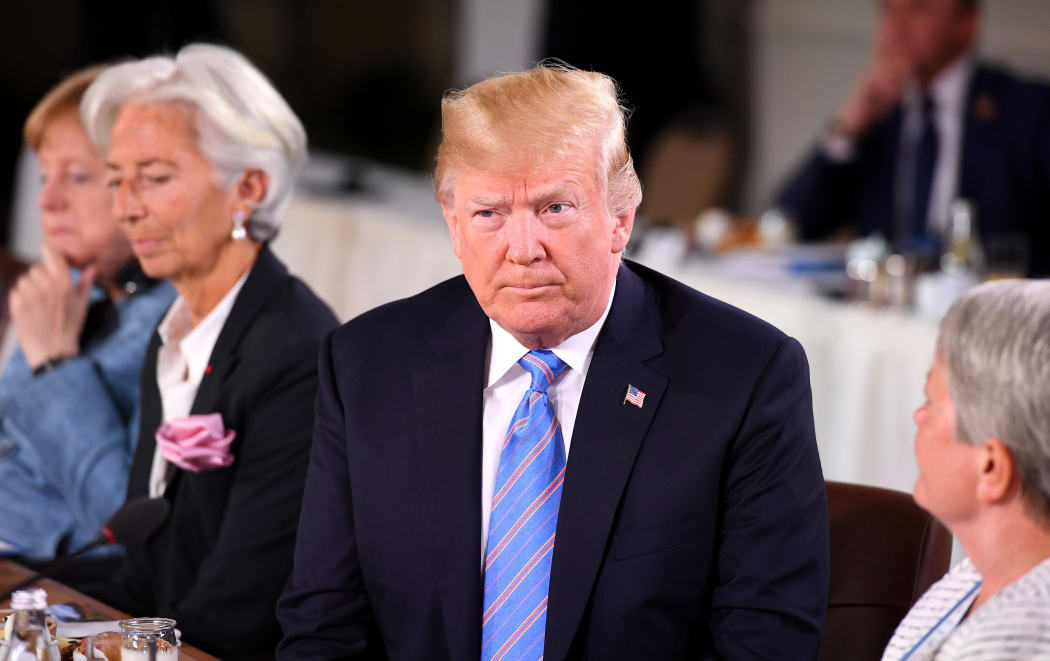US President Donald Trump has told Group of Seven leaders that the United States wants a quick end to trade practices that he says have led to an exodus of American companies and jobs to other countries.

Photo: AFP
"The United States has been taken advantage of for decades and decades," Mr Trump said at a press conference on the second day of a two-day summit in Canada.
He said he had suggested to the other G7 leaders that all trade barriers, including tariffs and subsidies, be eliminated.
"You go tariff-free, you go barrier-free, you go subsidy free," he said.
"I did suggest it and people I guess were going to go back to the drawing board."
Mr Trump denied that the summit had been contentious, a remark that contradicted what one G7 official described as a bitter harangue on Friday between the US President and his counterparts over tariffs.
In an "extraordinary" exchange, Mr Trump repeated a list of grievances about US trade - mainly with the European Union and Canada, a French presidency official said.
"And so began a long litany of recriminations, somewhat bitter reports that the United States was treated unfairly, that the trading system was totally unfavourable to the United States, the American economy, American workers, the middle class," the official said.
"In short, a long, frank rant which is undoubtedly very unusual in this kind of formats."
French President Emmanuel Macron responded in a "courteous but very firm tone" to present the European side of the story, and Japanese Prime Minister Shinzo Abe chimed in as well, the official said.
On Saturday, Mr Trump arrived late for the first working session on gender equality but Canadian Prime Minister Justin Trudeau forged ahead with opening remarks without him, commenting wryly about "stragglers".
Despite the apparent acrimony, Mr Macron said the G7 -which groups the United States, Canada, Great Britain, France, Italy, Germany and Japan - has succeeded in coming up with a joint declaration on trade.
"This agreement... is good news and it marks a collective desire to stabilise things," Mr Macron said.
"Nevertheless, I do not consider that with a declaration all is obtained and it is obvious that we will have in the coming weeks, the next months, to continue to work."
German Chancellor Angela Merkel acknowledged differences between the United States and the six other members of the G7 remained, but said a joint statement on trade was expected to be issued at the end of the summit.
"For us, it was important that we have a commitment for a rule-based trade order, that we continue to fight against protectionism and that we want to reform the WTO," Ms Merkel told reporters.
Mr Trump left the summit earlier than planned on Saturday to fly to Singapore to meet with North Korean leader Kim Jong-un, which he described as a "mission of peace."
His early departure means he will miss a working session among the leaders on climate change and clean energy, as well as talks among the G7 and poorer countries focused on the health of oceans.
The early exit also means he will be gone before allies begin closing news conferences likely to be laden with criticism of the US stance on trade and Mr Trump's abrupt suggestion on Friday that Russia be re-admitted to the elite grouping.
Russia was suspended from the group in 2014 because of its annexation of Crimea from Ukraine.
Ms Merkel said EU countries at the summit agreed that the conditions to readmit Russia had not been met and even Moscow seemed to reject the suggestion.
Mr Trump's presidency has been clouded by a federal investigation into alleged Russian meddling in the 2016 presidential election, and possible collusion by his campaign.
Both Moscow and Mr Trump have denied the allegations.
- ABC

